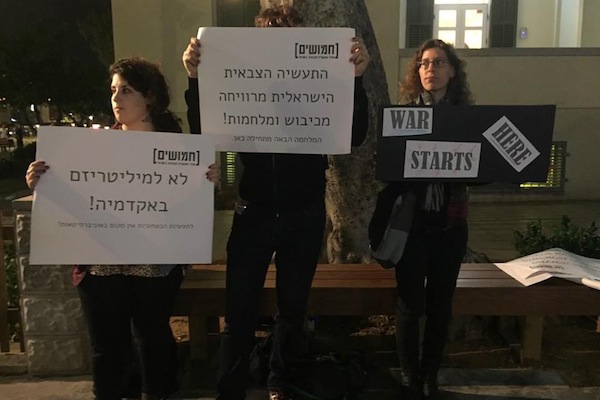A new university course at Israel’s Technion Institute of Technology teaches students how to brand and market Israel’s defense industry to global audiences.
By Shimrit Lee

Contrary to popular belief, Israel’s military-industrial complex doesn’t run on government and arms manufacturers alone. Academia, a sphere often imagined as a bastion of free speech, independent from corporate interests, plays a crucial, though less visible, role in the establishment. Its complicity in violence shouldn’t be ignored.
That’s why last Thursday evening, I joined a small group of activists from Coalition of Women for Peace in central Tel Aviv to protest a new program, put on by Haifa-based Technion—Israel Institute of Technology, Israel’s foremost research university, outside its Tel Aviv campus in the city’s Sarona neighborhood.
The three-month program, titled “Defense Strategy for International Markets,” focuses on how to brand and market Israel’s defense industry to global audiences. This is the second time the course, which was designed for executives, lawyers, consultants, and researchers in the field of defense exports, is being offered by the Technion. Workshops focused on export regulations, cyber warfare, homeland security, marketing communication strategies, and case studies from South Africa and India.
As shoppers walked past the modest demonstration, some stopped with curiosity to read our signs and ask why we were there. Others were more defensive. One man even threatened us with a gun tucked into his pants, while menacingly waving a laser pointer in our faces and muttering that he would “erase” us.

I couldn’t help but note the irony of his word choice, since erasure — of lives, rights, and history — was exactly what we were there to protest. The defense industry is the largest employer in Israel, which means it has largely been immune to criticism. But it has recently come under increased scrutiny for its role in exporting arms to repressive regimes.
In January, a group of Israeli human rights lawyers submitted an urgent petition to the Israeli Supreme Court calling for an end to Israeli military exports to Burma, highlighting the country’s systematic persecution of its 1.2 million ethnic Rohingya Muslim minority. Eitay Mack, a Jerusalem-based human rights attorney involved with the petition has filed a suit to open criminal investigations into Israeli officials who participated in arms deals with the brutal dictatorial regime of Augosto Pinochet, responsible for murdering, disappearing and torturing tens of thousands of Chilean citizens from 1973 to 1990.
Israel has also been complicit in maintaining commercial and military ties to South Sudanese militias in the ongoing bloody civil war, the government of South Africa during apartheid, and the Hutu government while it carried out genocide against the Tutsi population of Rwanda.

However, Israeli academia’s complicity in those, and other conflicts is less frequently scrutinized. It’s time for that to change, says the Coalition’s Shahaf Weisbein. “The protest aimed to make militarism in academia more visible,” Shahaf says. “Through academia, the arms industry can present itself as furthering technological and theoretical advancements, disconnected from any violent effects on the ground.”
In December, Hamushim — an arm of the Coalition that investigates Israel’s security industry — launched a Hannukah campaign that included eight small actions aimed at raising awareness on the issue of the arms industry, which included a condemnation of the Anti-Defamation League for its sponsorship of U.S. law enforcement training in Israel. This week, the group launched a letter writing campaign to the Technion, demanding the university cancel the course in the future and avoid “caving into militarism in the academy.”
“Defense Strategy for International Markets” may be a new course, Shahaf says, but this isn’t the first time the Technion has coordinated with the defense industry.
The university developed the remote-controlled Caterpillar D9 bulldozer, used by the Israeli army to demolish Palestinian homes. Electro-Optics Research & Development (EORD), a subsidiary of the university, manufactured the “Scream,” an acoustic system that “creates sound levels that are unbearable to humans at distances up to 100 meters.” Also called “the Shofar,” this “non-lethal” crowd control weapon is mainly used to suppress non-violent demonstrations in the occupied Palestinian territories.

In 2013, Meir Shalit, the academic manager of the Technion course, was forced to resign from his own position as the department head for defense exports at the Defense Ministry after supervising an arms shipment to France, which ended up in China — a breach of U.S. arms trade regulations.
Most disconcerting, perhaps, is the Technion’s close ties to Elbit Systems, Israel’s largest publicly traded arms and security company responsible for 85 percent of drones used by the Israeli military, as well as the electronic surveillance system on Israel’s separation wall in the West Bank. According to researcher Shir Hever, the Technion in Haifa opened a center for electro-optic research with Elbit, and the Technion “specifically trains students to work in Elbit.”
On the Israeli Left, resistance to militarism is often thought about only in terms of army refusal. But Sahar Vardi, an anti-militarism activist, says that academia is often overlooked as an effective space for students and professors to mobilize.
“This project can feed conversation surrounding the academic boycott of Israeli institutions when brought into the international arena,” she said,
At the end of Thursday’s protest, the manager of the course emerged, clearly irritated, with two police officers by his side. Sahar described the ensuing confrontation as a success: “Organizing some kind of action against such a blunt example of academic complicity will hopefully serve as an energizing force for more action on the subject,” she said.

